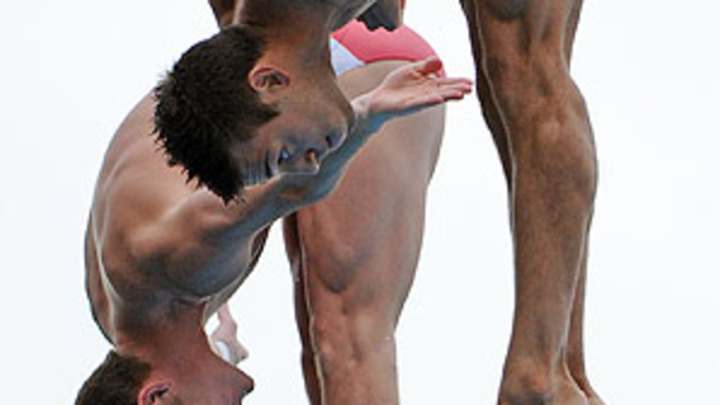Diving partners Boudia, McCrory stay in sync despite distance

Boudia, 23, who finished fifth in synchronized platform diving with former partner Thomas Finchum in Beijing, lives and trains in Indiana, not far from his alma mater Purdue University. Originally a gymnast, he decided after watching the '96 Olympics at age 7 that that was the future he wanted for himself. He burned out of gymnastics four years later, but easily transitioned to diving.
He was homeschooled for his final two years of high school so that he could train for seven hours during the daytime and focus on academics at night. The juggling act continued even after the Olympics.
"Right off the plane from Beijing, I went to my very first class [at Purdue]," he says with a laugh. "I'd missed the first few days, and I was late because as a freshman didn't know where my classes were."
McCrory, 20, who is trying to make his first Games, lives and trains in North Carolina, where he has withdrawn from Duke University for the year to focus on his diving. He started as a swimmer, but says, "Before I could even swim I was asking to go off the diving board." His parents let him switch when he was 8.
He continues to know exactly what he wants.
"I'll never forget," says Drew Johansen, his coach both at Duke and in international training, "within the first few weeks when I was working with him, he did a dive and I said, 'That's great! That would be nine, nine and a half.' And he looked me and said, 'What do I need to do to make it a 10?' It caught me off guard. He was 16! But it's that attention to detail that stands out."
Boudia and McCrory train in separate facilities, dive off separate platforms into separate pools, receive coaching from separate coaches, and only find themselves together at length during tournaments.
There is an added twist: Although they are working hard toward an Olympic medal in synchronized diving, they will also compete in the individual event. Within a given day, they go from teammates to opponents.
And yet, they refuse to prioritize one event over the other.
"It's important to be the best individual diver that you can be," says McCrory, "and it will work out with synchro as well."
For Boudia especially, his current situation is new: For six or seven years until 2009, he competed exclusively with Finchum -- whose home pool was the same as his. When McCrory emerged, the three rotated partners for about a year -- Boudia/Finchum at one event, Boudia/McCrory at another, McCrory/Finchum at a third -- until USA Diving high performance director Steve Foley selected the Boudia/McCrory pair as the one most likely to be successful at the highest level.
"Really what it came down to was who was doing the hardest dives," says McCrory, "so we were kind of trying out all the possibilities, but as time went on it came down to who was doing the most difficult dives and doing them well."
In diving, each dive has a set degree of difficulty from which points are deducted based on execution. The higher the degree of difficulty, the higher the possible score. When Boudia and McCrory proved able to complete dives with high degrees of difficulty, they got the nod.
The transition was a potentially uncomfortable situation, but everyone handled it as well as could be expected.
"It was left in the pool," says Johansen. "It wasn't a subjective decision."
"There was no emotion," Boudia agrees.
Nonetheless, where once he could breathe the same air as his partner all the time, now Boudia relies on technology to keep him and McCrory in sync. Since they do not share a coach, decisions must be made by consensus, so Johansen and Adam Soldati, Boudia's coach, record practice sessions at every opportunity, send footage back and forth -- "We can share video over the Internet almost simultaneously," says Johansen. "It's almost like we're in the same pool" -- and discuss it at length. They make decisions about ideal form for every inch of each dive and then coach it so that by the time the divers are together again, they have already made the same adjustments.
And what of arguments about how to proceed?
"We haven't had any major disagreements," says Johansen, declining to name an alpha coach between the two, "and I think that's because Nick and David are such a natural pair."
Their success together has been encouraging. They won gold at the '10 AT&T USA Diving Grand Prix and took fourth at the '10 World Cup and fifth at the '11 world championships. Individually, along with a slew of NCAA awards and victories, Boudia came in eighth at the '10 World Cup and McCrory came in fifth at the '10 Grand Prix, eighth at the '10 World Cup and sixth at the '11 world championship.
Perhaps it's not the ideal arrangement, but everyone involved insists the time apart helps.
"When they're apart, they're worried," says Johansen. "When Nick's training here and David's training there, he's worried that David's getting a little better, so he ups his level, and I'm sure it's the same for David."
